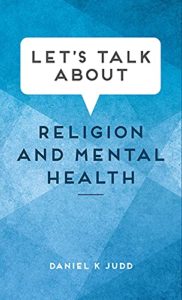Review
Title: Let’s Talk About Religion and Mental Health
Author: Daniel K Judd
Publisher: Deseret Book
Genre: Non-Fiction
Year Published: 2021
Number of Pages: 144
Binding: Paper
ISBN: 978-1629728254
Price: 11.99
Reviewed by Conor Hilton for the Association of Mormon Letters
Daniel K. Judd’s Let’s Talk About Religion and Mental Health is one of the inaugural volumes in a new series from Deseret Book titled “Let’s Talk About”. The book is entering an already loaded conversation, where almost everyone involved has a variety of needs and expectations for how the intersection of mental health and religion should be responded to. Judd’s book is a valuable contribution to that conversation, particularly well-suited for folks well within the conventional bounds of Latter-day Saint orthodoxy.
Judd offers a fairly clear and frank perspective on how to think about religion and mental health, drawing on a vast array of personal experiences, many from friends and acquaintances of Judd. He also incorporates a variety of insights from clinical psychology and scientific research surrounding mental health, presented alongside quotes and teachings from scripture and church leaders. This blend of information and resources may be off-putting for folks that don’t think that religious and spiritual teachings have anything to offer in terms of coping with mental health challenges.
One of Let’s Talk About Religion and Mental Health’s largest strengths is the way that it relies primarily on personal stories to explore the nuances and wide variety of experiences that folks have with mental health. Judd selects experiences from folks with a range of different official and unofficial diagnoses, and with varying degrees of severity within those diagnoses. Importantly, many of the individuals who share their stories are folks who either were serving in leadership positions or otherwise faithful, ‘righteous’ people when they first grappled with their own mental health challenges. This decision helps challenge the pernicious folk belief that some people have that mental illness in any of its many manifestations is a result of sin or wrongdoing. Not only does Judd use examples to implicitly counteract that harmful idea, but he also explicitly refutes that idea.
Another choice that I found very helpful, is that Judd uses experiences where the individuals arrived at a place of stability and comfort with their mental health through a wide range of means. In doing this, he highlights the complexity of dealing with mental health and that every individual will have a slightly different journey towards a mentally healthy place—some people will use medication, some therapy, some may use either or both of those options temporarily, and some people may need a change in circumstances. Judd repeats over and over again that each person’s path to health is different and should be navigated with the help of various mental health professionals and spiritual guidance.
There’s a section of Let’s Talk About Religion and Mental Health that is explicitly about scrupulosity and how it might manifest in religious people, which I found very charitable and empathetic. The insights from this section color other parts of the book, where Judd makes sure to explicitly state that sometimes praying more, increasing your scripture study, and otherwise trying to be more and more ‘worthy’ of God’s love may actually backfire and be an example of “looking beyond the mark”. I know many people who have struggled with these impulses and direct or indirect counsel to simply increase their righteous works and who have been hurt by that counsel. For those people and countless more like them and all future generations of people in the church, I hope Judd’s insights on this are spread far and wide to help ease the burdens that some of our brothers, sisters, and friends in Christ bear.
Overall, Let’s Talk About Religion and Mental Health is a solid, quick read that I hope can do good in continuing to improve the conversation within the Church about mental health. If you are already on board with the need for seeking professional help and don’t believe that mental health challenges are a result of sin or personal worthiness, then you probably won’t find much new here. But the book offers a soft, yet authoritative counter to some pernicious folk teachings and some vivid, insightful, and hopeful examples. A great read for church leaders wanting a model on how they could approach talking about the intersection of mental health and religion, as well as folks that want to better know how they can minister to those in their lives that wrestle with mental illness in any of its many varied forms.

